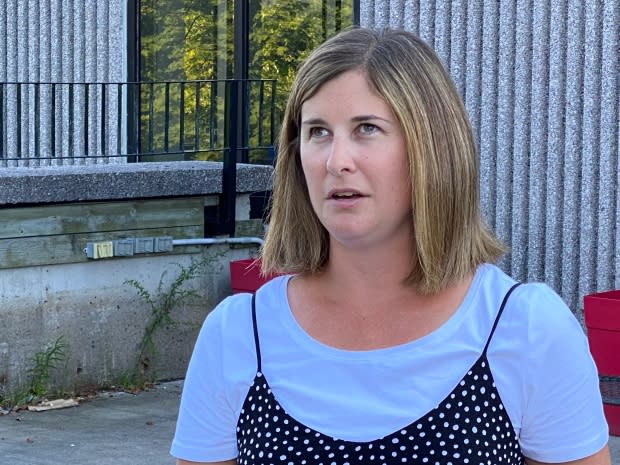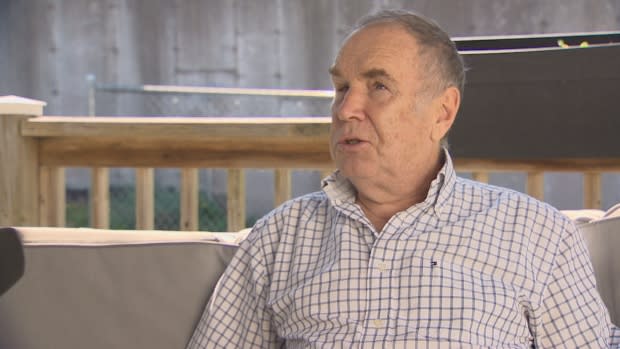How blind Nova Scotians are navigating the strange world of COVID-19
Carrying on a normal life during the pandemic can be difficult for everyone, but some people with vision loss say it can be a minefield.
Darlene Wournell is blind and treasures her independence, but she says some of the measures put in place to reduce the spread of COVID-19 have proven to be especially challenging.
"Of course, not having any vision whatsoever, it's hard to tell if people are within your six foot bubble," said Wournell, a resident of Lake Echo, N.S., and the national secretary of the Alliance for Equality of Blind Canadians.
Before the pandemic, she and her guide dog Demetris would walk up the road to Highway 7 and get a bus if she needed to go shopping or visit Halifax. But Wournell said running errands is a different story in this new normal.
"It's even more difficult when you have a guide dog like I do. People tend to try to reach out and pet your dog all the time, which can cause a problem," she said.
"Of course, you don't know if anybody has COVID, which becomes a problem when you get home. It's almost like you have to sanitize your dog as well."

Demetris has been her constant companion for more than two years, but the attention he attracts has changed that.
"When I do go grocery shopping with family, I will leave my dog home because we're stopped so much by the public," she said.
She also said distancing on public transit can also be tricky, because she can't see the signs or her fellow passengers to know where she can sit. Wournell says she relies heavily on the bus drivers or members of the public to help her figure out where she can sit.
'The dog doesn't know where the arrows are'
Service dogs and their owners are facing other unforeseen obstacles posed by physical distancing measures.
Shelley Adams, who works for the CNIB Foundation, is blind and was happy to be able to return to the Halifax Shopping Centre when measures were relaxed.
But she said she had to rely on the kindness of other shoppers to help her negotiate the new directional rules.
"I knew I was going to go in there. There were going to be arrows and things I'm supposed to follow, but the dog doesn't know where the arrows are," said Adams.
"I'm very comfortable with the mall and we kind of have our routes that we take. So I did go with somebody for the first time ... so they could tell me the arrows are on this side of the hallway or that side."

She thinks more could be done in buildings to ensure that directions are accessible to everyone.
"I think it would be great to have some tactile markings on the ground and contrast too, because for those who are partially sighted, having good contrasting colours for the arrows is important," she said.
Shopping presents many challenges
Adams said blind and partially sighted people are having an especially difficult time grocery shopping. People using a cane or with a guide dog aren't able to use a shopping cart, but some supermarkets have removed baskets as a precaution during the pandemic.
Adams recalled one person she knows with vision loss who had to speak with a manager before she was given a basket.
Barry Abbott, who is blind, says he found the frequent contact with surfaces while shopping to be so troubling he switched to online ordering.
"When you're blind, touch is your primary sense besides hearing," he said. "So, something as simple as, say you are paying for something ... you've got to feel where the reader is so you can hold your card over."

Wournell says she has also switched to ordering her groceries online.
COVID-19 makes isolation 'even worse'
Fear of the virus and frustration with the maze of obstacles created by pandemic measures has increased the isolation of many blind and partially sighted people, Wournell said.
"Most people are isolated long before the pandemic started. Nowadays it's even worse," she said. "I haven't seen my friend since March ... so it's been quite some time since I actually got together with anybody."
According to Abbott, advances in technology have taken some of the sting out of the isolation for those able to afford it.
"We're lucky that we live in an age that we have modern communication, that we can at least still talk to people to some extent, depending on your income level," he said.
Abbott said the pandemic offers an opportunity for people with disabilities to raise longstanding issues to achieve meaningful change.
"It's something that people haven't thought about, and those of us with disabilities have a responsibility to make very clear what we need," he said.
MORE TOP STORIES


